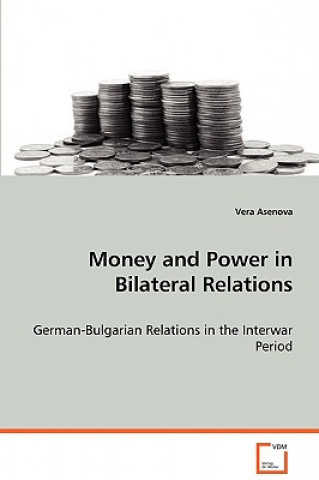
Kód: 06813074
Money and Power in Bilateral Relations
Autor Vera Asenova
As a response to the Great Depression in 1931 Germany adopted a policy of exchange control where the movement of foreign currency was subject to government control. This regime served as a defense measure against currency devaluat ... celý popis
- Jazyk:
 Angličtina
Angličtina - Väzba: Brožovaná
- Počet strán: 56
Nakladateľ: VDM Verlag Dr. Mueller E.K., 2008
- Viac informácií o knihe

Mohlo by sa vám tiež páčiť
-

Understanding ERISA
22.32 € -4 % -

Confessions de Tullia
27.75 € -4 % -

School Of Life (1905)
23.86 € -

Possibilities and predictabilities by atosiban
63.70 € -

In Their Own Voices
76.30 € -

India Orissa
97.19 € -

Foreign Affairs
20.17 € -12 % -

Remember Your Rubbers!: Collectible Condom Containers
29.49 € -5 % -

Menstrual Cycle
197.57 € -12 % -

Stephen Ward
15.97 € -

Atchafalaya River Basin
40.14 € -

Watching
8.29 € -

New Day
23.24 € -

La Connaissance Scientifique Et Son Processus Selon Gaston Bachelard
52.02 €
Darujte túto knihu ešte dnes
- Objednajte knihu a vyberte Zaslať ako darček.
- Obratom obdržíte darovací poukaz na knihu, ktorý môžete ihneď odovzdať obdarovanému.
- Knihu zašleme na adresu obdarovaného, o nič sa nestaráte.
Viac informácií o knihe Money and Power in Bilateral Relations
Nákupom získate 157 bodov
 Anotácia knihy
Anotácia knihy
As a response to the Great Depression in 1931 Germany adopted a policy of exchange control where the movement of foreign currency was subject to government control. This regime served as a defense measure against currency devaluation but it inhibbited international payments among exchange control countries.Trade between them was organized on the basis of bilateral clearing agreements, which centralized both foreign trade and payments at the state level. The book analyzes the clearing system in the case of Germany's relations with Bulgaria, which developed the highest trade dependence on Germany in the 1930s. An almost complete opposition of free trade, bilateral clearing is seen as a mechanism of political power maximization and resource allocation from the periphery to its core. Using Jonathan Kirshner's framework of monetary power the work offers a detailed analysis of the link between international monetary relations and political power. The shift of international trade regime from a Gold Standard and free trade to exchange control and bilateral clearing provided an opportunity for the German government to covertly finance its expenditure in the 1930's and during WWII. As a response to the Great Depression in 1931 Germanyadopted a policy of exchange control where themovement of foreign currency was subject togovernment control. This regime served as a defensemeasure against currency devaluation but itinhibbited international payments among exchangecontrol countries.Trade between them was organized onthe basis of bilateral clearing agreements, whichcentralized both foreign trade and payments at thestate level.The book analyzes the clearing system in the case ofGermany's relations with Bulgaria, which developedthe highest trade dependence on Germany in the 1930s.An almost complete opposition of free trade,bilateral clearing is seen as a mechanism ofpolitical power maximization and resource allocationfrom the periphery to its core. Using JonathanKirshner's framework of monetary power the workoffers a detailed analysis of the link betweeninternational monetary relations and political power.The shift of international trade regime from a GoldStandard and free trade to exchange control andbilateral clearing provided an opportunity for theGerman government to covertly finance its expenditurein the 1930's and during WWII.
 Parametre knihy
Parametre knihy
Zaradenie knihy Knihy po anglicky Society & social sciences Politics & government International relations
63.70 €
- Celý názov: Money and Power in Bilateral Relations
- Podnázov: German-Bulgarian Relations in the Interwar Period
- Autor: Vera Asenova
- Jazyk:
 Angličtina
Angličtina - Väzba: Brožovaná
- Počet strán: 56
- EAN: 9783639033892
- ISBN: 3639033892
- ID: 06813074
- Nakladateľ: VDM Verlag Dr. Mueller E.K.
- Hmotnosť: 86 g
- Rozmery: 229 × 152 × 3 mm
- Dátum vydania: 07. August 2008
Obľúbené z iného súdka
-

Prisoners of Geography
11.15 € -23 % -

Tragedy of Great Power Politics
21.50 € -9 % -

Rethinking Fiscal Policy after the Crisis
169.10 € -

Chaos in the Liberal Order
25.29 € -24 % -

Geopolitics and Geoculture
32.87 € -4 % -

Diplomacy
16.48 € -24 % -

On Palestine
10.64 € -21 % -

Righteous Victims
20.48 € -19 % -

World Order
11.36 € -24 % -

Clash of Civilizations and the Remaking of World Order
16.79 € -15 % -

Legacy of Ashes
17.91 € -14 % -

Who Rules the World?
14.23 € -18 % -

Image and Reality of the Israel-Palestine Conflict
31.44 € -13 % -

Tao Of Spycraft
43.01 € -

Grand Chessboard
22.73 € -

Who Rules the World?
11.26 € -25 % -

Hundred-Year Marathon
16.58 € -22 % -

Adults In The Room
13.10 € -22 % -

Cold War
16.89 € -22 % -

Planetary Cycles Mundane Astrology
19.96 € -

America's Secret War
15.35 € -9 % -

My Nationalist Pony
36.86 € -

PostCapitalism
10.95 € -24 % -

Lords of the Desert
9.62 € -20 % -

Drone Theory
10.13 € -22 % -

Romania and the European Union
41.47 € -

Human Rights and European Law
108.87 € -

Diplomatic Theory from Machiavelli to Kissinger
214.68 € -

Second Chance
29.39 € -

Rise and Kill First
16.48 € -24 % -

The Spy and the Traitor
10.95 € -24 % -

PEACE TO END ALL PEACE
21.09 € -23 % -

Dead Aid
16.69 € -9 % -

Evolution of Cooperation
19.14 € -

World Order
16.48 € -3 % -

Countdown to Zero Day
16.89 € -17 % -

Political Order and Political Decay
15.25 € -23 % -

Strategic Vision
16.17 € -21 % -

Secret World
18.32 € -24 % -

Naked Diplomat
14.43 € -23 % -

After the Empire
15.97 € -

Understanding the Intelligence Cycle
78.14 € -

Revenge of Geography
18.43 € -21 % -

Oxford IB Diploma Programme: Global Politics Course Book
58.37 € -

Dawn of Eurasia
12.28 € -23 % -

Emergency Sex (And Other Desperate Measures)
16.58 € -23 % -

Diplomatic Protocol
40.35 € -

How Spies Think
10.95 € -24 % -

Post-American World
12.28 € -23 %
Osobný odber Bratislava a 2642 dalších
Copyright ©2008-24 najlacnejsie-knihy.sk Všetky práva vyhradenéSúkromieCookies



 21 miliónov titulov
21 miliónov titulov Vrátenie do mesiaca
Vrátenie do mesiaca 02/210 210 99 (8-15.30h)
02/210 210 99 (8-15.30h)